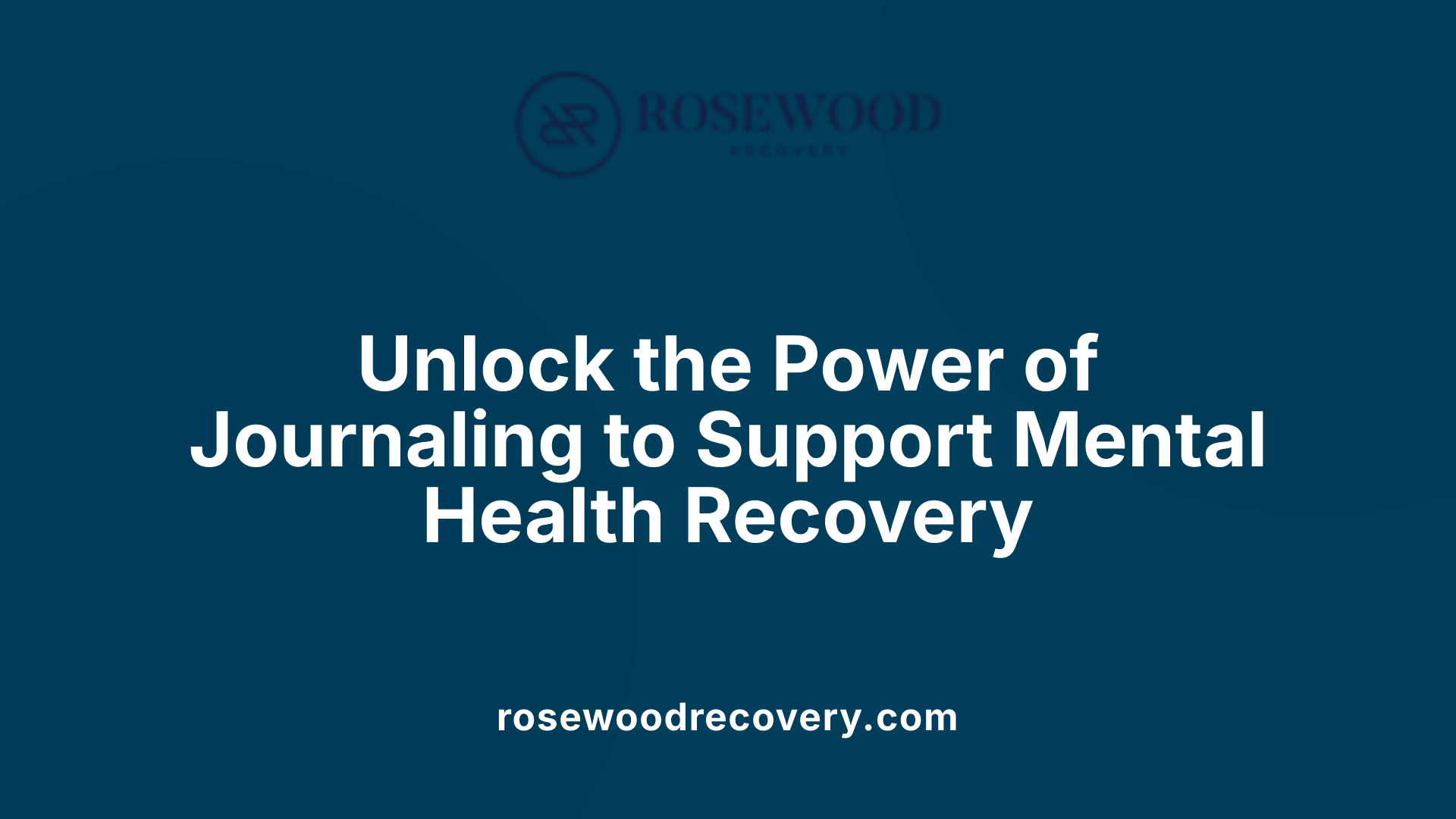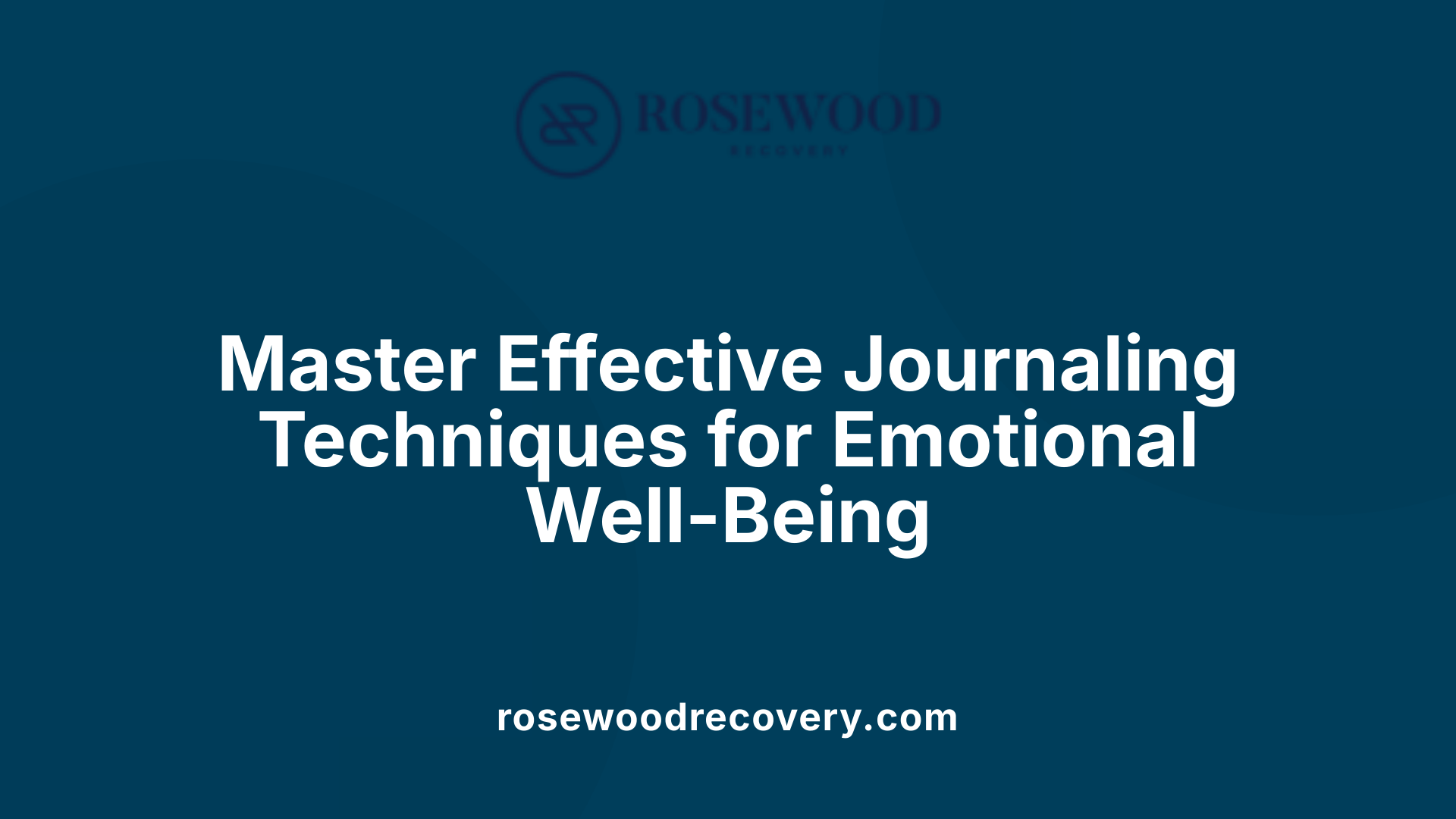Unlocking Emotional Resilience Through Therapeutic Writing
In intensive outpatient programs (IOP) and partial hospitalization programs (PHP), patients face the challenge of managing complex emotional states amidst structured treatment. Emotional journaling emerges as a powerful, evidence-based tool that complements professional therapy by providing a safe space for self-exploration, emotional regulation, and trauma processing. This article explores how journaling enhances mental health during recovery, integrating techniques suitable for both virtual and in-person settings, fostering resilience, and promoting long-term well-being.
The Therapeutic Role of Journaling in Mental Health Recovery

What are the benefits of emotional journaling in mental health treatment, such as PHP or IOP?
In intensive outpatient and partial hospitalization programs (IOP and PHP), emotional journaling plays a vital role in supporting recovery. This practice provides a safe, structured outlet for expressing personal thoughts and feelings without fear of judgment. By externalizing internal struggles, individuals can process emotions more effectively, reducing feelings of stress and overwhelm.
Journaling promotes mental clarity and mindfulness, helping individuals become more aware of their emotional states and triggers. Techniques such as expressive or gratitude journaling can lessen psychological distress, foster positivity, and build resilience. Regular writing encourages self-awareness, which is crucial for recognizing warning signs of relapse and managing symptoms of anxiety, depression, or trauma.
Moreover, journaling supports emotional regulation by helping individuals identify and work through difficult emotions, develop healthier coping strategies, and reinforce personal growth. Its flexibility allows it to be tailored to individual needs, making it a cost-effective supplement to therapy that enhances overall treatment outcomes.
How can journaling for 10 minutes a day benefit mental health?
Spending just 10 minutes daily on journaling can significantly improve mental health. This brief routine offers consistent emotional processing, helping to unload pent-up feelings and reduce daily stress. It creates space for reflection, enabling individuals to better understand their thoughts, habits, and emotional reactions.
With regular practice, journaling enhances self-awareness and emotional regulation, fostering a calmer and more focused mindset. It can also uncover patterns or triggers that influence mental health, providing insight that guides healthier decisions and coping strategies.
Additionally, this simple habit acts as a form of mindfulness, grounding individuals in the present moment. Over time, it cultivates resilience, promotes a positive outlook, and reduces symptoms of anxiety and depression, contributing to overall well-being.
How does journaling improve emotional regulation?
Journaling supports emotional regulation by offering a personal space for expressing and understanding feelings. It allows individuals to process emotions at their own pace, which reduces the intensity of distressing feelings and enhances self-awareness.
Regular writing helps identify emotional triggers and recognize recurring patterns, enabling better management of stress and anxiety. It also breaks the cycle of rumination by fostering reflective thinking, which encourages a more balanced and mindful approach to emotional challenges.
Furthermore, journaling promotes self-validation and compassion by acknowledging difficult emotions without judgment. These practices strengthen emotional literacy and resilience, helping individuals respond more adaptively to stressors. Ultimately, journaling empowers users to maintain emotional stability and cultivate healthier reactions to life's ups and downs.
What types of journaling are most beneficial for mental health?
Different journaling styles serve various therapeutic purposes. Journaling that focuses on positive memories or includes gratitude lists can shift focus away from negativity, fostering hope and optimism. These practices help reframe thoughts and reduce rumination.
Incorporating creative elements such as doodles, stickers, or colorful imagery can make journaling more engaging and boost mood. Artistic expression within journaling not only enhances emotional release but also stimulates imagination and joy.
Other effective forms include structured prompts that target specific themes like self-compassion, coping strategies, or goal setting. These guide individuals to explore their emotions constructively.
Ultimately, combining these techniques based on personal preferences and needs maximizes the mental health benefits of journaling, supporting ongoing emotional growth and recovery.
Techniques and Methods for Effective Emotional Journaling

What are the benefits of emotional journaling in mental health treatment, such as PHP or IOP?
In mental health treatment programs like Partial Hospitalization Programs (PHP) or Intensive Outpatient Programs (IOP), journaling acts as a valuable tool to support recovery. It provides a safe space for individuals to express their emotions freely without fear of judgment, which is crucial during intense therapy phases.
Regular journaling can significantly improve mental clarity and self-awareness. It helps individuals identify and understand their triggers, emotional patterns, and behavioral responses, fostering mindfulness about their mental states.
Moreover, journaling promotes emotional regulation by externalizing internal struggles, thus reducing feelings of stress and anxiety. It also aids in trauma recovery by assisting patients in processing difficult memories and emotions constructively.
Studies, such as a 2022 paper, highlight that journaling enhances positive outlooks and fosters resilience. Techniques like gratitude journaling—focusing on positive experiences—contribute to mood improvement and overall well-being.
In summary, incorporating journaling into treatment plans is a low-cost, adaptable method that bolsters mental health recovery by complementing therapy, promoting emotional insight, and supporting continued personal growth.
What techniques and methods of emotional journaling are most effective in treatment settings?
Various journaling methods have proven effective in therapeutic contexts, especially when tailored to individual needs. These include:
- Free Writing: This involves writing continuously without censorship or specific structure. It allows for spontaneous release of emotions and uncovers subconscious thoughts.
- Guided Prompts: Therapists may provide specific questions or themes, such as exploring feelings about a recent event, to direct introspection and insight.
- Creative Approaches: Using art, poetry, or visual journals can deepen emotional expression. Creativity can help individuals access feelings that are difficult to articulate with words alone.
- Digital Journaling: Utilizing apps or online platforms allows for flexible, private, and accessible journaling, encouraging consistent practice.
- Thematic Journals: Focusing on themes like gratitude, resilience, or goals helps channel energies toward positive growth and skill-building.
In clinical sessions, therapists often incorporate prompt-based journaling. For example, a prompt such as “Describe a recent situation that made you anxious and how you responded” can guide clients to process specific feelings, enhancing their awareness and coping skills.
Getting familiar with different methods allows individuals to find what resonates most, increasing engagement and therapeutic effectiveness.
How can journaling be adapted to individual preferences?
Personalization is essential for making journaling a sustainable tool. Some individuals prefer writing by hand in a traditional notebook, which can enhance mindfulness and connectedness. Others might opt for digital formats on smartphones or computers for convenience and privacy.
Those with artistic inclinations may incorporate drawing, doodling, or collages to express complex emotions non-verbally. Poetry or storytelling forms can also serve as powerful outlets.
Timing can be personalized as well—some find journaling most helpful in the morning to set intentions, while others prefer it before bed to reflect on the day.
Creating a comfortable environment, whether quiet corners or designated spaces, supports regular practice. Additionally, adjusting the frequency—from daily to weekly—aligns with individual schedules and emotional needs.
Encouraging flexibility and experimentation allows individuals to discover what makes journaling meaningful and enjoyable.
How is journaling integrated into therapy sessions?
Journaling enhances therapy when used as an active part of the treatment process. Therapists may assign specific journaling exercises between sessions, such as tracking moods, challenges, or successes.
During sessions, reviewing journal entries can offer valuable insights into the client’s progress, emotional triggers, and recurring themes. This discussion fosters deeper understanding and supports goal setting.
Prompt-based journaling during therapy can direct focus toward unresolved issues or new insights. For example, prompts might explore recent emotional responses or record reflections on therapeutic exercises.
In virtual or remote settings, journaling provides continuity and touchpoints for ongoing self-reflection outside of scheduled meetings. Digital journaling apps facilitate sharing selected entries with therapists, promoting collaboration.
Some programs, like IOPs, integrate structured journaling into their curricula by including goal tracking, gratitude exercises, and trauma narratives, which reinforce therapeutic work and encourage ongoing growth.
In conclusion, tailored techniques, flexible formats, and strategic integration make journaling a potent complement to professional therapy, fostering autonomy, insight, and resilience in recovery.
Practical Approaches for Implementing Journaling in PHP and IOP

What are the benefits of emotional journaling in mental health treatment, such as PHP or IOP?
Emotional journaling plays a vital role in mental health treatments like Partial Hospitalization Programs (PHP) and Intensive Outpatient Programs (IOP). It provides a safe, personal space for individuals to express their thoughts and feelings, helping to facilitate emotional processing and stress relief. By externalizing internal struggles, journaling aids in gaining mental clarity and fosters greater self-awareness.
Regular practice supports mindfulness and resilience, which are important in managing symptoms of anxiety, depression, and trauma. Techniques such as expressive writing and gratitude journaling have a proven track record for reducing psychological distress, lifting mood, and promoting positive thinking. Incorporating journaling into treatment plans complements therapy by enabling clients to track their progress, recognize patterns, and develop healthier coping mechanisms. Overall, journaling enhances emotional regulation and personal growth, making it a valuable, adaptable tool in mental health recovery.
How can journaling be integrated into virtual or in-person PHP and IOP programs?
Journaling can be seamlessly incorporated into both virtual and in-person treatment programs through various approaches. Therapists often assign guided prompts and reflection exercises following group sessions, encouraging clients to explore their inner experiences independently. This reinforces session topics and fosters ongoing self-reflection.
Digital platforms and physical notebooks provide different options for engagement. Some programs utilize online journaling tools or mobile apps that allow instant access and ease of use. Sharing insights from journaling during group therapy sessions can reinforce peer support, while therapist review of entries (with the client’s consent) helps tailor interventions and monitor progress.
Flexibility is a key advantage; clients can journal at their own pace and in their preferred medium, whether digital or paper. This adaptability makes journaling a versatile, accessible addition to structured recovery environments and enhances individual engagement in treatment.
What practical tips can help clients start and sustain a journaling habit?
Starting a journaling routine can feel overwhelming, but practical steps can foster consistency and enjoyment. First, establishing a regular schedule—such as dedicating a few minutes each morning or evening—creates a habit. Consistency helps turn journaling into a natural part of daily life.
Choosing the right format is important. Some prefer digital tools like mobile apps or computer documents for convenience, while others find comfort in traditional pen-and-paper journals. Starting with brief, manageable entries reduces pressure and encourages regular practice.
Using prompts or themed topics, such as gratitude lists or reflection questions, can provide inspiration and structure to writing sessions. Overcoming common barriers, like lack of time or fear of judgment, involves creating a designated quiet space and reminding oneself of the benefits of journaling.
Celebrating milestones, like completing a week of daily entries, boosts motivation. Reflecting on personal progress and noticing emotional or behavioral changes reinforces commitment and makes journaling a rewarding part of recovery.
Case Studies and Evidence Supporting Journaling in Recovery
What are the benefits of emotional journaling in mental health treatment, such as PHP or IOP?
Journaling plays a vital role in mental health treatments like Partial Hospitalization Programs (PHP) and Intensive Outpatient Programs (IOP). It offers a safe, structured space for individuals to explore and express their thoughts and feelings without fear of judgment. This process promotes emotional catharsis, helping release pent-up emotions and process unresolved trauma.
By engaging regularly in journaling, clients often experience increased mental clarity and mindfulness. These benefits support personal growth and resilience, aiding in managing mental health symptoms such as anxiety and depression. Specific techniques like expressive writing and gratitude journaling have been linked to reductions in psychological distress and mood improvements.
Additionally, journaling enhances self-awareness by helping individuals recognize their triggers, emotional patterns, and underlying motivations. Over time, this practice contributes to better emotional regulation, allowing clients to respond more adaptively to stressors. Overall, integrating journaling into mental health treatment provides a versatile, low-cost method that complements therapeutic efforts, fostering recovery and long-term well-being.
What evidence supports the use of journaling in addiction recovery and mental health treatment?
Scientific research supports strong links between journaling and positive recovery outcomes. A notable study published in 2022 highlights how regular writing fosters optimism by encouraging individuals to recognize past progress and visualize future success, reinforcing motivation.
Case studies involving virtual rehab settings demonstrate practical benefits. Clients who engaged in journaling reported increased self-awareness, better management of cravings and triggers, and improved ability to monitor their emotional states. Quantitative measures revealed reductions in stress levels and mood enhancements, critical factors for maintaining sobriety and mental health.
Furthermore, journaling helps externalize negative thoughts and feelings, enabling cognitive restructuring that alleviates emotional burdens. Such processes are comparable to techniques used in Cognitive Behavioral Therapy (CBT), providing a foundation for healthier thought patterns and behaviors. Collectively, these findings endorse journaling as an effective, evidence-based adjunct in comprehensive recovery programs.
How do virtual recovery programs incorporate journaling to support clients effectively?
Virtual recovery programs leverage various journaling practices to bolster their clients’ progress. Pre-therapy prompts guide individuals in reflective writing before formal sessions, priming their mindset for deeper engagement. After group discussions, clients often complete reflection exercises to process insights and reinforce learning.
Weekly goal tracking is a common feature, helping clients document their objectives, victories, and setbacks in a tangible way. Digital platforms such as mobile apps and online journals facilitate easy, accessible journaling, allowing users to write at any time and place that suits them.
Therapists review selected journal entries (with client consent) to tailor interventions and identify specific emotional triggers or recurring themes. This personalized approach ensures treatment remains responsive and targeted.
Peer support is likewise strengthened through sharing journal insights during virtual group sessions, fostering a sense of community, accountability, and mutual encouragement. This ongoing practice not only promotes continuous self-reflection but also sustains therapeutic accomplishments outside regular meetings, embedding journaling as a core component in the holistic path toward recovery.
| Aspect | Implementation | Benefits | Supporting Evidence |
|---|---|---|---|
| Prompts | Pre-session questions, post-session reflections | Stimulates introspection | Enhances self-awareness, emotional processing |
| Digital Platforms | Mobile apps, online journals | Accessibility, flexibility | Improves engagement and consistency |
| Therapist Review | Analyzing entries for tailored interventions | Personalized care | Better symptom management and trigger recognition |
| Peer Sharing | Group discussions on journal themes | Support and motivation | Increased motivation, sense of community |
| Goal Tracking | Weekly or daily progress logs | Motivation, accountability | Improved adherence to recovery plans |
Journaling seamlessly integrates into various stages of virtual recovery, helping individuals articulate their experiences, process emotional challenges, and reinforce their commitment to sobriety and mental health.
Conclusion: Embracing Journaling as a Cornerstone of Recovery
 Journaling has proven to be a valuable tool in the journey of addiction recovery, offering numerous mental and emotional health benefits. It facilitates catharsis by allowing individuals to release pent-up emotions and process unresolved trauma, creating space for healing. This process is especially important during recovery, where emotional regulation is often challenged. Writing about feelings helps externalize internal struggles, providing a safe outlet for expressing joy, sorrow, frustration, and gratitude without judgment.
Journaling has proven to be a valuable tool in the journey of addiction recovery, offering numerous mental and emotional health benefits. It facilitates catharsis by allowing individuals to release pent-up emotions and process unresolved trauma, creating space for healing. This process is especially important during recovery, where emotional regulation is often challenged. Writing about feelings helps externalize internal struggles, providing a safe outlet for expressing joy, sorrow, frustration, and gratitude without judgment.
One of the most significant advantages of journaling is promoting self-reflection and gaining insight into personal patterns, triggers, and motivations. This heightened self-awareness helps individuals understand their behaviors, identify challenges, and develop proactive strategies for change. Whether through free writing, guided prompts, or creative approaches like poetry and art, journaling encourages deeper self-exploration, fostering growth and resilience.
Beyond emotional release and self-awareness, journaling supports stress reduction by helping individuals externalize stressors and explore coping strategies. Scientific research shows that consistent journaling can lower cortisol levels, reduce anxiety, and shift emotional responses from the amygdala to the prefrontal cortex, aiding in emotional regulation. This biological effect contributes to better mental health outcomes, including improved sleep quality, lower blood pressure, and decreased symptoms of chronic pain.
In the context of addiction and mental health treatment, journaling enhances problem-solving skills and the ability to set and track goals. Documenting progress and challenges helps reinforce recovery efforts and reinforces motivation. Additionally, journaling fosters emotional regulation by helping individuals develop self-compassion, recognize emotional triggers, and build healthier coping mechanisms.
Different techniques, such as gratitude journaling, trauma narratives, and mindfulness practices like reflection and meditation, can be tailored to the individual’s needs. In virtual intensive outpatient programs (IOP) and other telehealth settings, journaling integrates seamlessly with therapy modalities like CBT, DBT, and trauma-focused approaches. It serves as both a reflective tool and an ongoing connection between therapy sessions.
Practical tips for effective journaling include establishing consistent routines, choosing formats that feel comfortable—digital or paper—and starting with small, manageable sessions. Overcoming common barriers, such as time constraints or self-doubt, can be addressed by incorporating prompts, celebrating small victories, and viewing journaling as a personal sanctuary.
Case studies from virtual rehab settings highlight how journaling increases self-awareness, helps manage triggers, tracks progress, and fosters a sense of agency. This ongoing record facilitates continuous reflection and growth, which is crucial in maintaining recovery post-treatment.
Journaling also supports broader well-being by improving communication skills, strengthening emotional intelligence, and nurturing positive self-talk. It encourages gratitude, which is linked to increased happiness and resilience, helping individuals focus on recovery milestones and personal achievements.
Overall, integrating journaling into addiction and mental health treatments creates a holistic approach that complements therapy. It empowers individuals with a valuable practice for ongoing self-care, emotional regulation, and personal development. As evidence from scientific research continues to support its benefits, journaling remains an accessible, flexible, and powerful tool—helping individuals navigate the complexities of recovery with greater clarity, resilience, and hope.
Empowering Recovery Through the Pen
Journaling stands out as a simple yet profoundly effective tool within PHP and IOP mental health treatments. Its capacity to facilitate emotional release, enhance self-awareness, and support trauma recovery aligns seamlessly with therapeutic goals. When integrated with structured therapy, whether in virtual or in-person formats, journaling reinforces resilience, fosters mindfulness, and assists in managing symptoms like anxiety and depression. As a flexible, accessible, and low-cost intervention, it empowers individuals to take an active role in their healing journey, making it an indispensable element of holistic mental health care.
References
- Recovery Through Writing: Journaling as a Therapeutic Tool
- The Power of Journaling and Writing in IOP Recovery - Bold Health
- Journaling for Recovery: How Writing Can Help You Heal
- Unlocking Emotional Wellbeing: Benefits of Journaling for Mental ...
- Journaling Mental Health - Black Horse Health
- Can journaling be part of virtual IOP programs? - Couples Rehab
- The Power Of Journaling For Your Mental Well-Being




